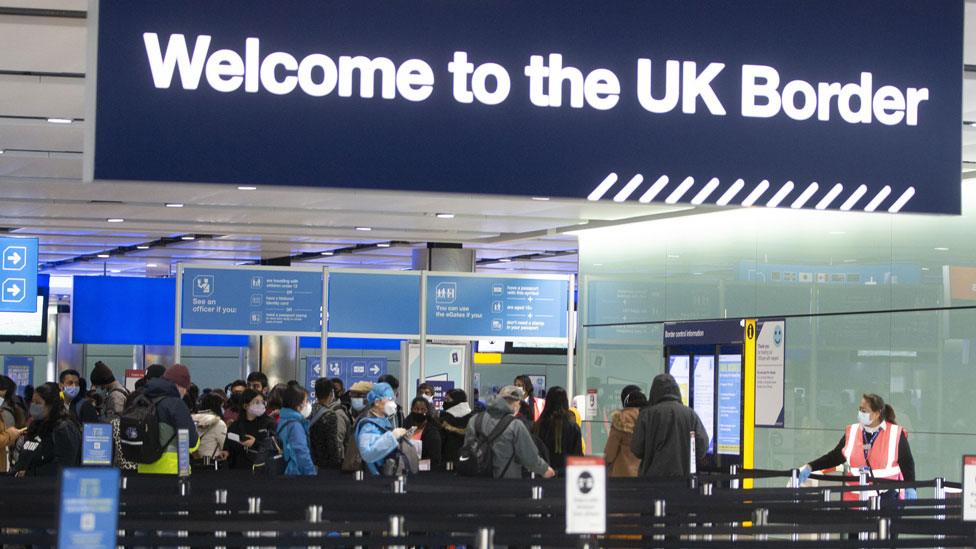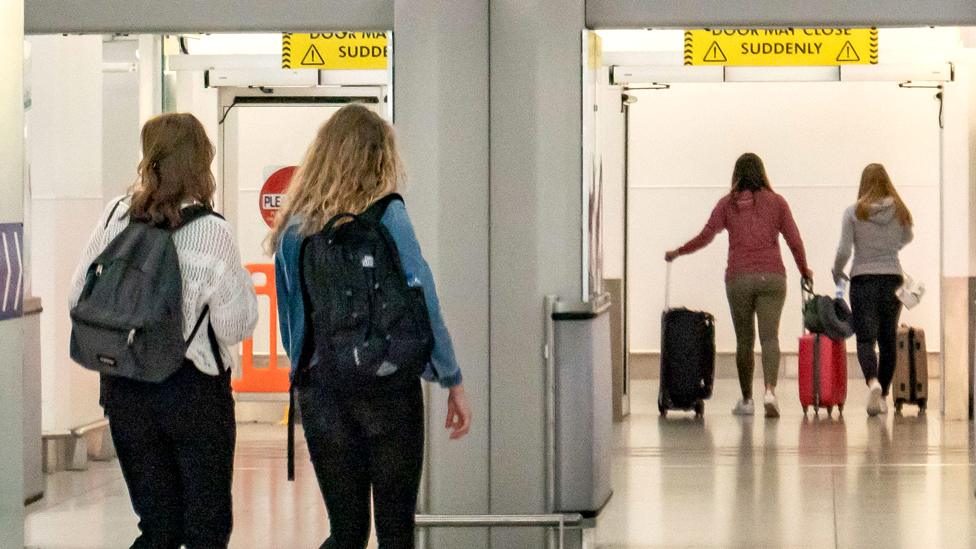Immigration can help push down UK inflation, says IMF deputy
- Published

Gita Gopinath said with inflation as high as it is, "there are benefits to having workers come in"
Immigration that fills gaps in the domestic jobs market can help push down UK inflation, the deputy head of the International Monetary Fund has said.
The prime minister has said rates of legal immigration are "too high".
Yet the IMF's Gita Gopinath told BBC Newsnight that "with inflation as high as it is... there are benefits to having workers come in".
The government said the immigration system could "flex to the needs of the economy".
Net migration - the difference between the number of people entering the country and those leaving on a long-term basis - is at a record level in the UK, at 606,000 in 2022, according to the Office for National Statistics.
Meanwhile, UK headline inflation fell to 8.7% year-on-year in April, but core inflation - which excludes volatile food and energy prices - rose to 6.8%, the highest in the G7.
"In this context, with inflation as high as it is, having workers who can fill the shortages in some of the sectors that we're seeing right now will help with bringing inflation down," Ms Gopinath, the deputy managing director of the IMF, said.
"So I think there are benefits to having workers come in."
The latest official statistics, external showed the UK still had more than one million vacancies in the three months to April 2023.
The industries with the highest vacancy ratios were accommodation and food (5.5%), health and social work (4.5%) and professional scientific jobs (4%).
Economists have identified the UK's tight labour market, exacerbated by the impact of Brexit on flows of European Union workers and the impact of the Covid pandemic, as one of the main contributory factors to high domestic inflation.
April's higher-than-expected inflation rates led many to predict the Bank of England will raise interest rates higher than previously thought, from their current 4.5% to above 5%.
But Ms Gopinath downplayed the idea that the UK has considerably worse core inflation than other developed economies.
"I wouldn't make a big difference between small differences in numbers in core inflation," she said.
Brexit effect
Ms Gopinath also told Newsnight that the IMF stood by its 2018 forecast, external that Brexit would reduce the long-term growth potential of the UK economy by 2.5% to 4% of GDP, equivalent to £900 to £1,300 per person.
"We put that estimate out around 2018 and we haven't done an update since then for the reason that we've had the pandemic and that we've had many other shocks," she said.
"So just identifying how much is purely Brexit becomes much harder to do. But if you look at the more recent estimates by the Bank of England and others, this is in the ballpark.
"Investment has been weaker since 2016, labour market flexibility has come down and the intensity of trade of the UK with the EU has come down. So all of these factors are in line with a weakening economy."
In a statement the Treasury said the UK had "moved away from the old model of unlimited, unskilled migration".
"We now have a points-based immigration system, giving the British people full control of the country's borders, which is designed to flex to the needs of the economy to ensure we have the skills we need.
"We want businesses to invest in our domestic workforce to fill labour shortages, but where there's an acute need for staff, we have also been flexible, including putting care homes and the seafood industry on the shortage occupation list," a spokesperson said.
You can watch the full interview with Gita Gopinath on Newsnight on BBC iPlayer
- Published17 May 2023

- Published19 May 2023

- Published23 May 2023

